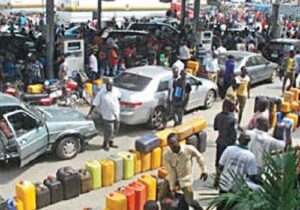Fuel Price Increase: Long Queues Return at Fuel Stations
Fuel Price Increase: Long Queues Return at Fuel Stations

Oil marketers have clarified that the recent rise in petrol prices is not the fault of filling stations, as long queues for fuel emerged in various locations over the weekend.
Several stations in cities like Lagos, Ogun, Abuja, and Port Harcourt were shut on Saturday, with dealers stating that they were waiting to adjust prices in line with ongoing developments. According to a report from Sunday PUNCH, the cost of petrol had climbed to between N1,050 and N1,150 per liter, depending on location, after the Dangote Petroleum Refinery and other depot owners increased their prices.
Marketers indicated that petrol prices are expected to keep rising due to the upward trend in crude oil prices. On Friday, the Dangote refinery raised its price for petrol from N899 to N955 per liter, which triggered a price increase at many retail stations on Saturday, while some chose to close temporarily to assess the situation.
One prominent marketer, speaking on condition of anonymity, emphasized that fuel stations should not be blamed for the price increase, stressing that the surge was linked to rising crude oil costs.
As many stations remained closed, those that stayed open sold petrol for more than N1,000 per liter in Lagos. Stations like MRS, which maintained a price of N935 per liter, saw long lines as motorists rushed to fill up.
The Petroleum Products Retail Outlets Owners Association of Nigeria (PETROAN) echoed the sentiment, explaining that the surge in petrol prices was tied to the increase in international crude oil prices. The price of Brent crude, the global benchmark, had risen to $80.85 per barrel, while WTI and OPEC baskets stood at $78.82 and $81.72 per barrel, respectively. The price hike followed new sanctions on Russian oil.
Dr. Billy Gillis-Harry, National President of PETROAN, pointed out that petrol prices are now determined by market forces, as per the Petroleum Industry Act, and that neither the government nor the Nigerian National Petroleum Corporation (NNPC) sets the prices. Therefore, refinery operators in Nigeria adjust their prices based on fluctuations in crude oil costs.
He noted that rising crude oil prices directly affect domestic fuel costs, and that retail outlet owners are struggling to manage the price volatility. Gillis-Harry reiterated that PETROAN members cannot sell petrol at a loss, and the price increase is a result of external factors, not the actions of retailers.
To address the situation, PETROAN has called for the privatisation of state-owned refineries and greater competition within the downstream sector. According to the association, privatisation could improve efficiency, reduce the government’s financial burden, and create a more competitive and stable market, ultimately benefiting Nigerian consumers.
Gillis-Harry also urged the government to foster a better business environment for retail outlet owners, suggesting that affordable financing and infrastructure improvements would help reduce operational costs, making fuel more affordable for Nigerians.
In a statement from PETROAN’s spokesperson, Joseph Obele, the association emphasized the importance of collaboration and investment within Nigeria’s petroleum sector. The statement came after the inaugural Petroleum Industry Stakeholders’ Forum in Abuja, where key stakeholders from the government, regulatory bodies, and the private sector gathered.
PETROAN’s President commended President Bola Tinubu’s decision to fully deregulate the sector and unify foreign exchange rates, as well as policies aimed at unlocking the potential of Nigeria’s petroleum industry.
PETROAN also shared its position paper at the forum, highlighting the achievements of Nigeria’s oil and gas sector in 2024, with the association’s more than 6,900 retail outlets playing a key role in ensuring smooth fuel distribution. PETROAN called for continued progress, recommending the privatisation of refineries, investment in infrastructure, and measures to combat cross-border smuggling. They also advocated for improved access to crude oil for local refineries.
TRENDING SONGS
 Heartbreak in Ikeja: Lady Weeps After Fufu Found in New Phone Package
Heartbreak in Ikeja: Lady Weeps After Fufu Found in New Phone Package
 Twist of Fate: Man Who Questioned Phyna’s ₦1Billion Demand Mourns Brother in Dangote Truck Crash
Twist of Fate: Man Who Questioned Phyna’s ₦1Billion Demand Mourns Brother in Dangote Truck Crash
 Tragedy in Enugu: Dangote Truck Claims Lives of Family of Five
Tragedy in Enugu: Dangote Truck Claims Lives of Family of Five
 Bangkok Crackdown: Nigerian-Thai Couple in Police Net Over Drug Trafficking
Bangkok Crackdown: Nigerian-Thai Couple in Police Net Over Drug Trafficking
 Family Rift: Reno Omokri’s Ex-Wife Says He Deserted Their Special Needs Son
Family Rift: Reno Omokri’s Ex-Wife Says He Deserted Their Special Needs Son
 The Man Who Sent Money for Two Decades, Only to Return to an Empty Shell
The Man Who Sent Money for Two Decades, Only to Return to an Empty Shell
 See how a young lady was beaten in a village and naked for stealing a goat
See how a young lady was beaten in a village and naked for stealing a goat
 See How Man That Plans to Divorce His Wife, Gets Shocked When She Leaves Him First With Their 5 Kids
See How Man That Plans to Divorce His Wife, Gets Shocked When She Leaves Him First With Their 5 Kids
 Tragic Land Dispute: Man Kills Father in Imo, Pastor Arrested for Rape
Tragic Land Dispute: Man Kills Father in Imo, Pastor Arrested for Rape
 Nigeria Grants Air Tanzania Passage for Direct Flights
Nigeria Grants Air Tanzania Passage for Direct Flights
Share this post with your friends on ![]()













